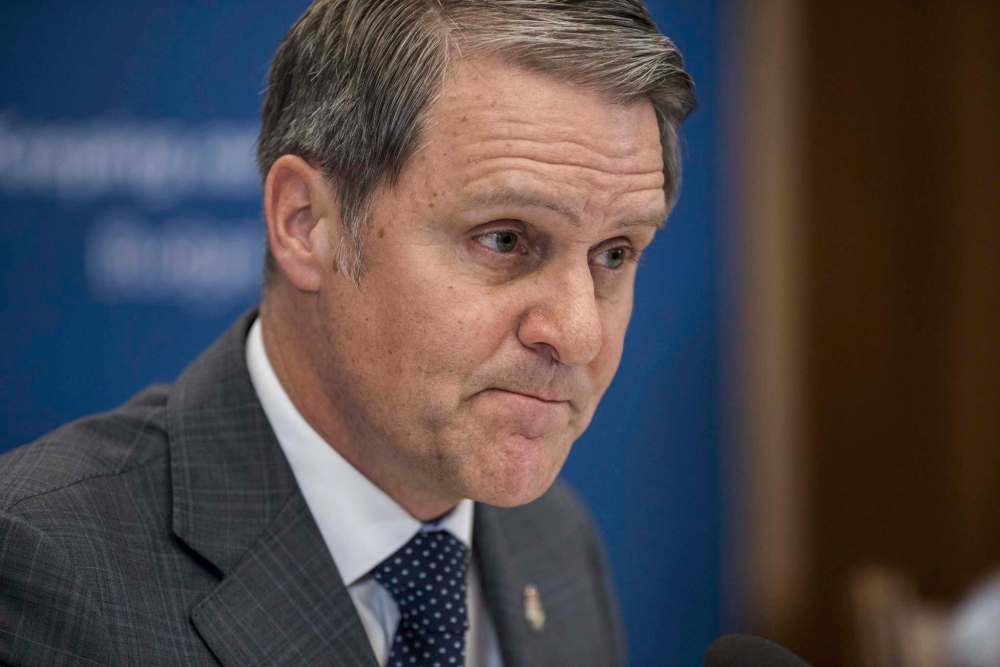Health minister defends near-$1M paid to consultant to help with health plan
Advertisement
Read this article for free:
or
Already have an account? Log in here »
To continue reading, please subscribe:
Monthly Digital Subscription
$0 for the first 4 weeks*
- Enjoy unlimited reading on winnipegfreepress.com
- Read the E-Edition, our digital replica newspaper
- Access News Break, our award-winning app
- Play interactive puzzles
*No charge for 4 weeks then price increases to the regular rate of $19.00 plus GST every four weeks. Offer available to new and qualified returning subscribers only. Cancel any time.
Monthly Digital Subscription
$4.75/week*
- Enjoy unlimited reading on winnipegfreepress.com
- Read the E-Edition, our digital replica newspaper
- Access News Break, our award-winning app
- Play interactive puzzles
*Billed as $19 plus GST every four weeks. Cancel any time.
To continue reading, please subscribe:
Add Free Press access to your Brandon Sun subscription for only an additional
$1 for the first 4 weeks*
*Your next subscription payment will increase by $1.00 and you will be charged $16.99 plus GST for four weeks. After four weeks, your payment will increase to $23.99 plus GST every four weeks.
Read unlimited articles for free today:
or
Already have an account? Log in here »
Hey there, time traveller!
This article was published 02/12/2019 (2197 days ago), so information in it may no longer be current.
The province paid a consultant close to a million dollars to help draw up the health plan announced Friday that promises to get services to rural Manitobans and reduce the strain on Winnipeg facilities.
The Manitoba NDP obtained details of the contract and raised the issue in the legislature Monday.
NDP Leader Wab Kinew predicted that rural Manitobans will not be impressed when they find out that “the government paid a private consultant about a million dollars to tell them to close their local (hospital) emergency room.”

“We saw the chaos that happened when they closed emergency departments here in Winnipeg,” Kinew said. “And now the government is exporting that outside the Perimeter.”
But Health Minister Cameron Friesen is defending the $911,485 consulting contract awarded to Deloitte.
Friesen said the government’s plan was written by Manitoba health leaders after consultations with thousands of health-care providers.
“(It) wasn’t written by a contractor,” the minister told reporters.
He said Deloitte’s role was to support the government’s work, particularly to provide help in “conducting outreach” in rural and northern areas of the province to make sure everybody was heard.
The Free Press reported in May that the province and Crown corporations had ordered more than $23 million worth of studies by private consultants since the Progressive Conservatives formed government in 2016.
Friesen said the former NDP government “didn’t ask for advice” and wound up with an expensive, under-performing health-care system.
“You can count on this government to be accountable for the use of taxpayers’ dollars,” he said.
Meanwhile, the Progressive Conservatives re-introduced a bill that died in the summer when Premier Brian Pallister called September’s early election.
Bill 10 (The Regional Health Authorities Amendment Act) provides the legal framework for much of the government’s health-care reforms, including the creation of Shared Health, the new provincial authority.
Under the proposed legislation, regional health authorities would remain responsible for administering and delivering health services in their regions. It would allow the provincial cabinet to transfer government responsibilities to a health authority.
Bill 10 is also intended to improve accountability for money spent, including the tightening of oversight over physician billing.
Proposed amendments include provisions to recover fees from physicians if a service is not rendered or if an MD is unable to produce adequate records that demonstrate that a service was provided, Friesen said.
He said that in 2015, under the NDP, physicians billed the province for $741 million. Of that, only $7,000 was determined to be in overpayment.
Dr. Fourie Smith, president of Doctors Manitoba, issued a statement Monday saying that his organization has no issue with the government collecting monies that have been incorrectly paid to physicians. He said it does not happen very often, but when it does, it should be repaid.
But he said his group is “deeply disappointed” that the bill “strips physicians of a fair dispute resolution process” when there is a disagreement about billing.
“This has been tried elsewhere in Canada with catastrophic results. Manitoba physicians do not deserve to be treated in such an unfair manner,” Smith said.
larry.kusch@freepress.mb.ca

Our newsroom depends on a growing audience of readers to power our journalism. If you are not a paid reader, please consider becoming a subscriber.
Our newsroom depends on its audience of readers to power our journalism. Thank you for your support.


